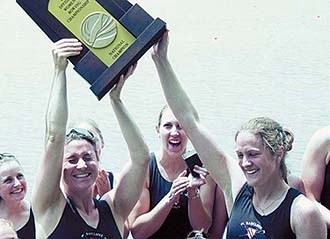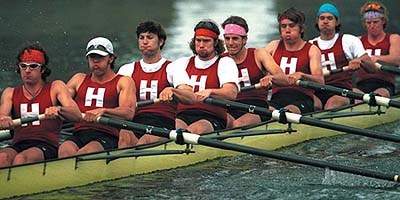Half a continent apart, on the weekend of May 31, three Harvard crews pulled off a feat unprecedented in the history of college rowing: simultaneous national championships in men's heavyweight, women's heavyweight, and men's lightweight rowing. The men dominated the Intercollegiate Rowing Association (IRA) regatta on the Cooper River in Camden, New Jersey, while the women triumphed at the NCAA Championships on Eagle Creek Reservoir in Indianapolis. Though the mighty oars of Newell and Weld Boathouses have long inspired wonder and sometimes awe, the 2003 trifecta is a new kind of high-water mark. Harvard's supremacy was the more remarkable in its decisive triumphs over many rowers with athletic scholarships.
No one finished within a length of the heavyweight men all year long. They demolished six other crews in four regattas before the Eastern Sprints, where Harvard won its first title since 1990. There, the heavies beat Wisconsin, the 2002 champions, by a length and a half. Another victory in the JV race and a second-place finish by the freshmen allowed the Crimson to retain the Rowe Cup for overall heavyweight supremacy.
 |
| Radcliffe crew captains Sarah Psutka '03 (left) and Courtney Brown '03 hold aloft the NCAA championship trophy after winning at Indianapolis. |
| Harvard Sports Media Relations |
Harvard entered the IRA for only the fourth time in the regatta's 108-year history. Scheduling conflicts with exams and a previous obligation to the 151-year-old Harvard-Yale boat race usually get in the way. But this year's calendar allowed Harvard to send to Camden a crew that had posted the Crimson's first unblemished season since 1980. Several years ago, the IRA was designated the regatta that decides the men's and lightweight women's national titles (only women's heavyweight rowing is an NCAA sport).
For the past four years California's heavyweight men have won the national title at the IRA. But there were no Harvard crews in those races. This year, the Crimson won its first Varsity Challenge Cup by open water (in 5:43) over Washington and California. By 750 meters, Harvard and Washington had broken contact with the field. With a "power 10" at that point and a 20-stroke move at 1000 meters, Harvard left the Huskies behind for good. The Crimson's last national title came in 1992, at the then-championship-deciding, season-ending regatta in Cincinnati.
The Harvard lightweights were not quite so invincible; they beat seven rivals in five regattas before the Sprints, but Navy edged the Crimson by less than a second on the Charles. At the Eastern Sprints, a crosswind affected the racing lanes unevenly and Harvard ended up fourth, more than four seconds behind the winners from Princeton, a crew that Harvard had beaten by more than five seconds just two weeks earlier. However, as head coach Charlie Butt told the Boston Globe, "They [his crew] are an exceptional bunch of guys for converting their disappointment into more boat speed." At the IRA, Harvard crossed two seconds ahead of Columbia, with Princeton nearly seven seconds back in fifth place. Thus the lightweights kept alive their odd-year streak of national titles that dates from 1991 (see "The Oddest Streak in Rowing," May-June 2002, page 68). Radcliffe's lightweight eight came second to Princeton in the final. The Harvard heavyweights captured the Ten Eyck Trophy for overall supremacy.
 |
| Harvard's heavyweight varsity, which won everything there was to win this year, in top form on the Thames River in New London, where they decisively beat Yale. |
| Courtesy of Jon Crispin |
No doubt these Saturday heroics helped to inspire the Radcliffe heavyweights, who by then had reached the finals of the NCAA Championships, scheduled for high noon on Sunday, June 1. Radcliffe's powerful crew had by then convincingly woman-handled its early opponents (see page 84). At the NCAAs, the Black and White capped off the greatest season in their 31-year history, earning their first national title since 1973, when they were unofficial U.S. champs. At Indianapolis, Radcliffe rowed through crews in the middle 1000 meters of the race, as they had done all season, finishing in 6:26, about half a length ahead of Michigan. The country's top-ranked crew, Stanford, was nearly a length back in third place.
It was the third NCAA championship in Harvard athletic history, the other two having come in men's hockey (1989) and women's lacrosse (1990). Although Harvard teams have now won 120 national championships, only three of these are NCAA titles.
As Radcliffe rowed to glory in Indianapolis, Harvard's heavyweight men followed the NCAA final's progress on the Internet from Red Top, Harvard's training camp near New London, Connecticut. Minutes after the women's victory, Harvard head coach Harry Parker telephoned his Radcliffe counterpart, Liz O'Leary, with congratulations on the splendid race that completed a supernal weekend on the water. Six days later, Parker's oarsmen added another kind of trifecta to this season of dreams, sweeping the freshman, JV, and varsity races with Yale. The varsity's 49.8-second victory margin was the largest since Crimson went over the horizon 1:04 ahead of Yale in 1976.
~Craig Lambert





